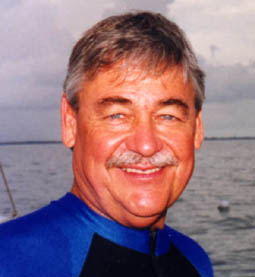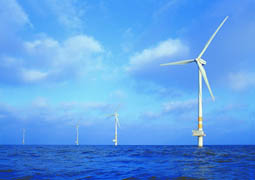
![]()
Volume 7, No. 2
Promoting Cooperation to Maintain and Enhance
Environmental Quality in the Gulf of Maine
|
||||||||||
|
Regular columns |
|
|
|||||||
|
|
|
|
Browse the archive |
|
|
|
|
From fish farms to wind farms, oil and gas drilling and more:
The growing demands on ocean waters incite the call for zoning
By Maureen Kelly
 |
| Bill Causey, the superintendent of the Florida Keys National Marine Sanctuary |
Billy Causey recalls the day, in the mid-1990s, that an angry mob of some 400 fishermen, treasure hunters and other coastal residents hung him in effigy–twice in the same day–and slashed all four tires of a colleague's car.
"It was one of the longest days of my life," says Causey, the superintendent of the Florida Keys National Marine Sanctuary (FKNMS).
Causey and his staff were in the midst of devising a comprehensive marine zoning plan to protect the resources and biodiversity of the 2,800 square mile [7,280 square kilometer] sanctuary, which contains the United States' only living barrier coral reef and thousands of acres of seagrass. The hostilities arose when certain members of the public learned that the plan designated no-take zones and restricted their activities in sections of the sanctuary. No-take zones, just one type of ocean zoning, are areas of the ocean where potentially harmful activities such as fishing and oil drilling are prohibited, while uses that are concordant with resource protection are allowed.
The concept of zoning marine waters has been used as a management tool around the world to balance resource protection and human use of marine areas. Causey describes it as a tool to separate incompatible activities, similar to how zoning is used on land.
"Hopefully," he jokes, "we don't end up with bars next to churches."
However, unlike land zoning, which largely regulates private property, ocean zoning governs a public resource and must balance the interests of a diverse set of resource users. It also might integrate the management functions of multiple government agencies that could have jurisdiction over an area.
 |
| A wind farm offshore in Massachusetts may look similar to this project off the coast of Sweden. Photo courtesy of Mark Rodgers, Cape Wind Associates |
While zones have existed in American waters for a variety of purposes such as conservation, fisheries management, navigation and oil and gas drilling, FKNMS was the first U.S. sanctuary to be given a congressional mandate to consider marine zoning as a means to balance the protection and use of its natural resources. The large-scale effort required planners to integrate local, state and federal jurisdictions as they strove to protect a fragile reef ecosystem threatened by multiple human activities that caused problems ranging from ship groundings to over-fishing to pollution.
Looking back Causey says the experience taught him a valuable lesson. With something that comprehensive, "if you don't listen to the community you're going to undermine your efforts," he says.
Learning from the effigy episode, the FKNMS planners made sure to involve the waterfront community as they established what is now the Tortugas Ecological Reserve within the sanctuary. The sanctuary's final management plan and boundaries of the reserve resulted with input from public meetings and a "working group" of fishers, divers, scientists, conservationists, citizens and government agencies.
Today, Causey says, scientists are seeing an increase of marine life in the protected areas, which will benefit fishermen in the long term.
Time to zone the Gulf of Maine?
Causey's experience may serve as a cautionary tale to policy-makers in the Gulf of Maine who are finding that the old approach to managing offshore lands and resources is no longer adequate.
 |
| Coastal residents hung Causey in effigy twice in one day while he was devising an zoning plan to protect the santuary. |
In the Northeast, the increasing use of ocean areas for a variety of often conflicting, activities–such as fishing, aquaculture, transportation, laying down of submerged fiber optic cables and oil and gas drilling–has raised the issue of whether an ocean zoning plan should be implemented in the Gulf of Maine. Adding impetus to the ocean zoning debate is the controversy over proposed offshore wind farms in Massachusetts.
At the heart of the controversy is a Massachusetts-based company, Cape Wind Associates, that has proposed to build 130 wind turbines on a 24 square mile [62 square kilometer] area of Nantucket Sound off Cape Cod. If approved, the $600 to $700 million development will be the first ocean wind farm in the United States and one of the largest offshore wind farms in the world. Another private developer has identified 21 sites along the U.S. East Coast for possible wind farm development and has filed for three projects in Massachusetts state waters and four sites in federal waters east of Nantucket off Cape Cod. Nationwide, there are more than 50 proposals for offshore wind farms.
The proposals have inadvertently highlighted gaps in state and federal authority to permit offshore uses and lease open space, and drawn attention to the need for government agencies to conduct planning for offshore activities.
The wind farm would be located along the Atlantic Flyway prompting concern that rotating blades on the 420-foot tall structures could pose a hazard to the many birds that migrate through the area. Some local pilots and ferry operators have voiced worries over navigation hazards to airplanes and vessels. Other critics of the project feel the phalanx of turbines four miles off Cape Cod's shores will be an eyesore and hurt tourism.
Some environmental, animal welfare and citizen groups oppose the project on grounds that the large industrial complex will produce negative ecological impacts, impede other activities on the Sound, and set a precedent that will open federal waters to greater industrialization. "We need to zone the ocean," as we zone the land for development and ocean areas for oil and gas development, says Isaac Rosen of the Alliance to Protect Nantucket Sound. Otherwise, he fears there will be a "wild, wild west mentality" as private developers stake out federal waters–so called Outer Continental Shelf lands-for everything from liquefied natural gas outposts to off-shore casinos.
Proponents of the wind farm proposal, including some environmental groups, say it is time to invest in clean energy sources. A recent oil spill in Buzzards Bay has bolstered their argument. In late April, a barge loaded with 860,000 gallons of oil leaked almost 98,000 gallons into the bay as it traveled toward the Cape Cod Canal to make a delivery to a power station in Sandwich.
The oil in the water did considerable damage to birds, shoreline and shellfish beds around the bay, south to the Rhode Island border. Proponents of wind energy say the oil spill points to the vulnerability of regions that depend on fossil fuels.
"If nothing else, this brings home the point of why we feel it's important to promote reliance on renewable energy," Greg Watson, vice president for renewable energy for the Massachusetts Technology Collaborative, told the Cape Cod Times.
Getting the ball rolling
 |
| Sign protesting Florida Keys zoning plan Photos courtesy of Billy Causey |
In light of the concerns about the uses of ocean waters for private development and need for ocean zoning, the Gulf of Maine Council and the Massachusetts Office of Coastal Zone Management held a forum last December in Boston, which brought together coastal management experts from the United States and Canada. The forum examined the status and effectiveness of ocean zoning programs already in place, and introduced a multi-use seafloor mapping initiative in the Gulf of Maine that may help coastal managers develop zoning plans.
Massachusetts is also in the process of creating a task force comprised of experts on local, state and federal coastal issues to examine ways to close the gaps in state ocean use policies and recommend a course of action.
"We have accepted zoning as a means of planning on land for appropriate uses of largely privately-owned property, while virtually no planning is done for ocean spaces, which are public," said Massachusetts Environmental Affairs Secretary Ellen Roy Herzfelder. "It is time to put some rational ocean management policies in place."
Many local lawmakers agree that a regulatory regime, at the federal and state level, is needed to govern the siting, construction, maintenance and oversight of projects in offshore waters and to address issues arising from conflicting use of ocean areas.
In March, Senator Edward Kennedy (D-MA) called for a National Academy of Sciences study to examine the "broad public policy implications" of the Cape Wind project and make recommendations to Congress.
Massachusetts Attorney General Thomas F. Reilly and Congressman William Delahunt (D-MA) have called for a moratorium on the Cape Wind project until regulations are in place. Delahunt has filed a bill, The Coastal Zone Renewable Energy Promotion Act of 2003, which would zone specific coastal areas for wind farm development. The legislation calls for the Secretary of Commerce to establish a licensing regime and permitting process to address issues involving resource allocation, multiple use and impacts on the marine environment. It also encourages states to amend their coastal zone management plans to include policies that address conflicting and multiple use issues.
Some environmental groups, while supportive of the wind farm and other renewable energy projects, are urging caution as Congress considers legislation overseeing offshore developments. In March, Peter Shelley of the Conservation Law Foundation (CLF) testified before the House Subcommittee on Energy and Mineral Resources on behalf of several environmental organizations–CLF, the Union of Concerned Scientists, Environmental Defense and the Natural Resources Defense Council. He advised that legislation overseeing offshore renewable energy projects be informed by the findings of the U.S. Commission on Ocean Policy and the Pew Oceans Commission on Ocean Zoning, both due to be released this year.
Meanwhile, back in Florida, Billy Causey knows that although ocean zoning can be a divisive issue and a challenge to implement, it is important for policy-makers to consider new ways to manage offshore lands in order to balance resource use and protection.
"We can't afford to make mistakes as we've done on land," Causey warns. We are witnessing our mistakes in managing ocean resources with collapsing fisheries, fish diseases and declines in habitat integrity, he adds.
"The ocean is unforgiving."
For more information on ocean zoning, including programs in place please read: "Ocean Zoning and the Gulf of Maine: A Background Paper," at http://www.state.ma.us/czm/oceanzoningreport.pdf.